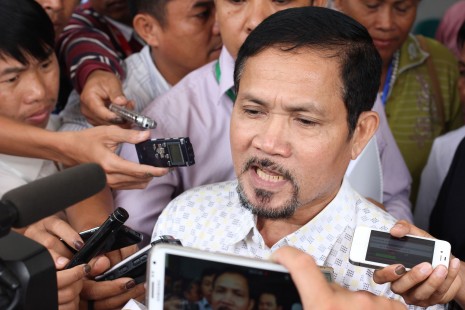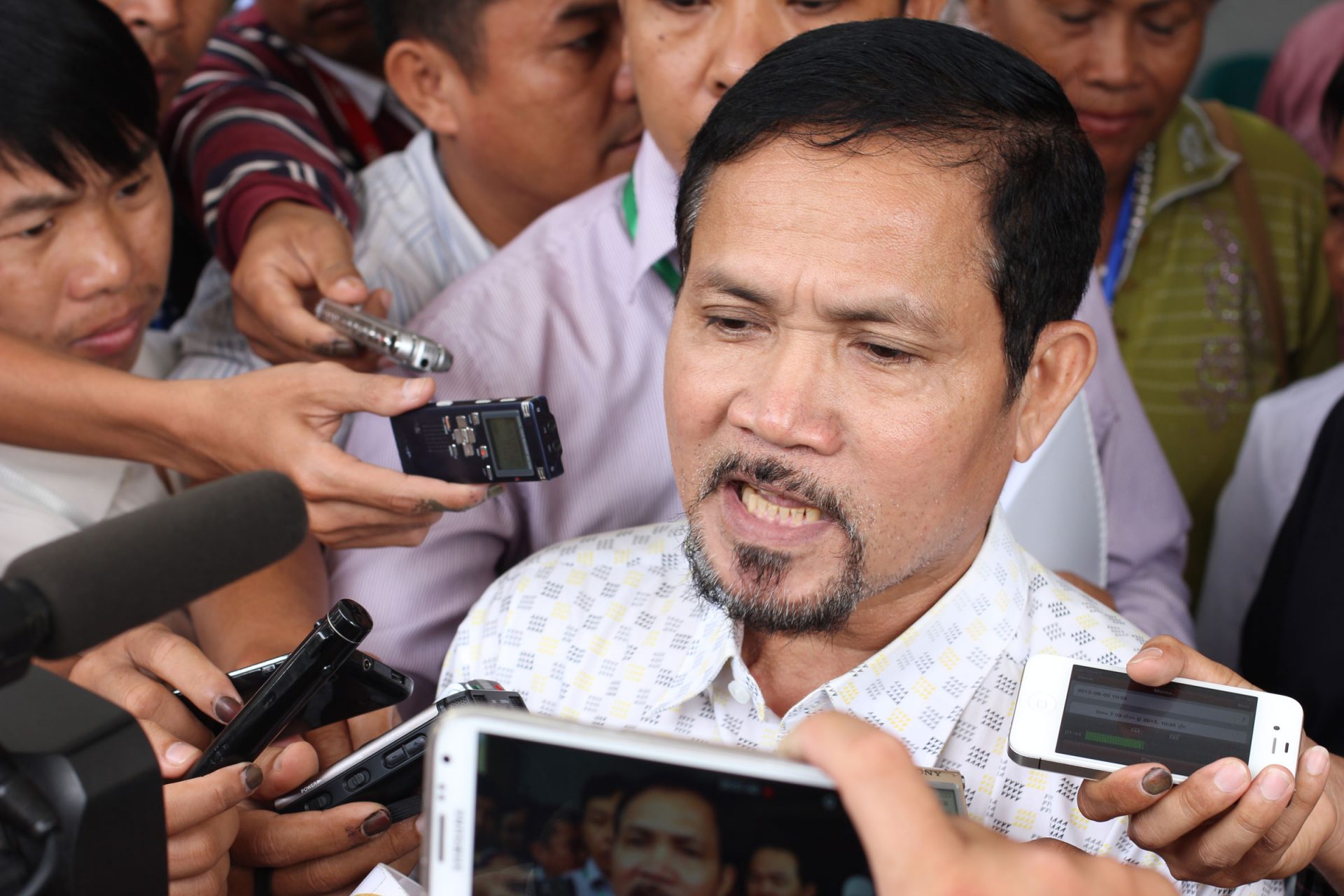A joint-party task force that the National Election Committee (NEC) on Saturday announced would be set up to investigate alleged irregularities during the July 28 national election was abruptly abandoned Sunday, with NEC President Im Suosdey announcing that his organization will instead push ahead with its own investigation.

The decision to end the short-lived investigation committee came after the opposition on Saturday night rejected the results of a meeting held earlier in the day with the CPP due to the fact that the ruling party insisted the U.N. have no authority in the investigation of vote irregularities.
“The NEC is very disappointed, as our hard work has not succeeded. The NEC is, however, optimistically committed to continue its efforts to settle the issue as soon as possible,” the NEC said in a statement, which was also broadcast on state-run TVK on Sunday afternoon.
Speaking to reporters outside NEC headquarters at the Ministry of Interior on Sunday, Mr. Suosdey said his organization could not wait for the CNRP to agree to join in the investigation, as the NEC has to resolve complaints of voting irregularities according to a preset election timetable.
“The NEC will work with participation from international and national monitors. The NEC will create a sub-committee to settle the irregularities step-by-step,” Mr. Suosdey said, without elaborating on who those monitors might be.
“If they [CNRP] don’t join us, we cannot wait for them; we have many things to do to follow our calendar,” he said.
Prime Minister Hun Sen said last week that electoral laws dictate that the National Assembly has to meet within 60-days of the July 28 election to form a new government.
Mr. Suosdey said the NEC was keeping to its original timetable announced last week, and it will begin examining election-related complaints after the deadline for submissions ends on Tuesday.
The opposition, which claims massive electoral fraud and says it won the poll, has insisted that the U.N. take over the central role on any joint-party committee after the NEC establishes one, a request CNRP president Sam Rainsy reiterated in a letter to the NEC released on Saturday night.
In the letter, addressed to Mr. Suosdey, Mr. Rainsy said that the opposition would not be part of any investigative committee until a place for the U.N. as a full participating member was made.
“The CNRP thinks that the composition of the committee proposed by the NEC is too narrow and contradicts the wishes of the CNRP,” he wrote.
That the NEC abandoned the joint-party committee less than a day after it had been created showed that the government was not really interested in resolving allegations of irregularities during the election, Mr. Rainsy said Sunday.
“It means…the CPP is afraid that the investigation committee will be open to people who have the experience and who have the expertise to collect the truth,” he said.
“We will never accept any final decision by the NEC now, meaning that this election dispute resolution process is not valid in our eyes, and has no legitimacy whatsoever,” he said.
“Cambodia is headed for large protests…and I think the whole world will understand why,” he added.
CNRP chief whip Son Chhay said that the opposition would now search for a new way to be involved in an investigation of election irregularities.
“Our party will look for other alternatives. You cannot say that because we will not attend [a joint-party committee meeting] straightaway at the request of the NEC, that we have to abandon everything all together,” he said.
“I don’t think that is the way to approach this, to get the two parties to find the political will to solve the problem.”
Information Minister Khieu Kanharith said that, in line with Prime Minister Hun Sen’s statements last week, the CPP can simply not allow international organizations to play an active role in any investigation of the election.
“We have made it clear that this is a matter of Cambodian sovereignty,” Mr. Kanharith said.
“I think we are now mature enough, and the NGOs and the [opposition] party are mature enough, to do an investigation without the United Nations,” he said.
“There is only one point: If the opposition wanted to investigate, they can go ahead with the NGOs here,” he said. “How much more does the opposition want?”
Koul Panha, executive director of the Committee for Free and Fair Elections, said the CNRP’s insistence that the U.N. be included as a full member of any investigation was reasonable.
“Observers would play only a very narrow role, but [organizations like the U.N.] are also able to provide technical support,” he said, adding that having international organizations as members of any investigation is necessary to ensure the credibility of any conclusions produced by the committee.
“Otherwise when the committee makes a decision, there will be questions of a conflict of interest—the NEC is part of what is being investigated,” Mr. Panha said.
A spokesman for U.N. Secretary General Ban Ki-Moon on Saturday released a statement saying that Mr. Ban welcomed the peaceful conduct of the election but also supported an investigation into alleged election irregularities.
“Amid reports of irregularities, the United Nations encourages the competent authorities to adjudicate complaints fairly and transparently, with the ultimate aim of ensuring the accurate determination of, and respect for, the will of the Cambodian people,” the statement says.
Philip Sen, a spokesman for the U.N.’s mission in Cambodia, said Sunday that the U.N. had yet to receive a request from either party to participate as a member or observer in any investigation into election irregularities.
“To date, the United Nations has not been approached by any of the entities concerned to discuss a proposed investigation committee,” he said.
“Upon receipt of any such request, the United Nations in Cambodia would refer the matter to New York.”
While the NEC had last week ruled out a joint-party investigative committee involving the ruling party and opposition as a move that would be outside the scope of its powers, on Saturday it did an about-turn, hosting a representative from each of the two parties to discuss the creation of one.
After the representatives emerged from the meeting, NEC Secretary-General Tep Nytha announced that both parties had agreed in principle to the creation of a committee to investigate irregularities.
“The meeting went well,” Mr. Nytha said Saturday. “In the end, both parties agreed on two issues: First, to create a joint committee that has the NEC and representatives of both parties. Second, that this joint committee will conduct a meeting to discuss its mandate and the scope of its activities.”
Kouy Bunroeun, the CNRP representative, echoed Mr. Nytha’s positive tone, saying members would soon be appointed to the newly formed group, and CPP representative Prum Sokha, a secretary of state at the Ministry of Interior, also said the meeting was positive.
“It’s going forward now. We’ve all agreed,” he said.




